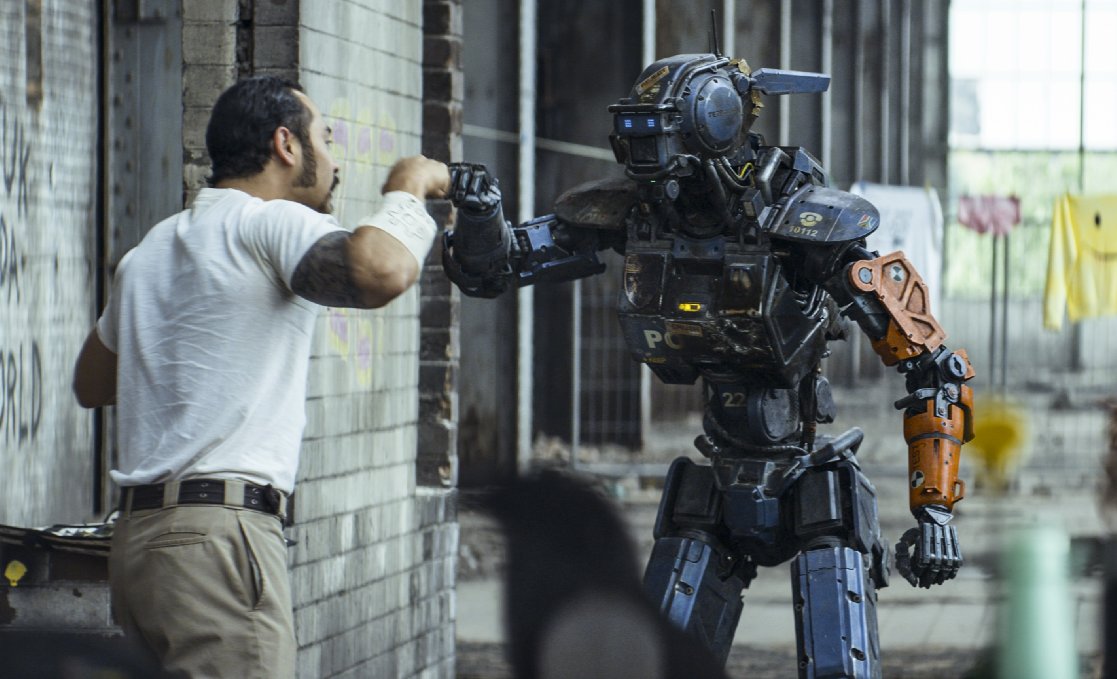Ever since Hal 9000 uttered the immortal words “I’m sorry, Dave. I’m afraid I can’t do that,” artificial intelligence has been a hot topic for science fiction movies. Chappie, the third film directed by Neill Blomkamp, attempts to put a fresh spin on the tired technological cautionary tales of The Terminator and The Matrix. The result is decidedly mixed, and the film’s inconsistency robs the audience of an emotional experience that’s hidden somewhere underneath the surface of Blomkamp’s subpar script.
Chappie reunites Blomkamp and District 9 star Sharlto Copley as the eponymous robot. It’s Copley’s performance that carries the film; the naivete and childlike innocence he injects into Chappie makes it easy for the audience to get involved in the character. Chappie may lack District 9’s allegorical punch or Elysium’s ambitious worldbuilding, but it makes up for this with a protagonist that is easy to root for. The film’s best moments come when the dialogue fades away, and Blomkamp is able to show Chappie’s inexperience visually through sight gags and pop-culture references.
Unfortunately, these subtle moments are few and far between. Blomkamp insists on hitting the audience over the head with the film’s messages about individualism and perseverance. The dialogue is, at times, cringeworthy, and the majority of the characters are poorly written.
Hugh Jackman’s antagonist falls into the same tired, one-dimensional trap as many of Blomkamp’s past villains, and his attempts at hunting Chappie in the latter half of the movie make little sense and feel unearned. Jackman clearly has fun with the role, but he isn’t given much substance to work with. Dev Patel’s Deon is extremely bland and doesn’t do much throughout the film besides chase after Chappie. And while Chappie’s innocence is endearing, Patel’s nerdiness gets old fast. Additionally, Sigourney Weaver’s corporate head is barely given anything to do, and her performance reeks of stunt-casting on Blomkamp’s part.
If anything, these constant failings within the script prove that Blomkamp is a director first and a writer second. The film is extremely well-shot, as Blomkamp somehow manages to give the film a gritty feel without having to resort to the constant use of a shaky camera (fledgling action directors take note). The film’s setting in South Africa doesn’t differentiate it from Blomkamp’s previous work, but his use of weather and framing makes for some excellent landscape shots.
The socio-economic commentary of District 9 and Elysium is still apparent, as Blomkamp is able to skillfully contrast the dourness of the slums that the thugs live in and the sleek and shiny corporate headquarters of Patel and Jackman’s characters. Hans Zimmer’s score heightens the tension at the dramatic moments, although the shoeing-in of Die Antwoord’s songs quickly become distracting.
Where District 9 felt original and innovative, the majority of Chappie feels tired and familiar. The film’s predictable ending opens the door for several moral quandaries that the film conveniently brushes aside. One scene towards the end, in particular, hints at a larger debate about the role of consciousness in artificial intelligence, but the conversation simply results in the creation of a cheap plot device. These types of moments become increasingly frustrating over the course of the film, as the viewer can’t help but get the feeling that there is a classic in the vein of District 9 fighting to get out of Chappie.
The film is at its best when it’s a purely visual experience, and these moments make the experience almost worth it. The sole fact that Chappie is an attempt at original science fiction filmmaking that isn’t a sequel, prequel, or remake nearly demands that the viewer buy a ticket. Unfortunately, Blomkamp’s poor script and wooden characters undermine what could have been an insightful look into the meaning of consciousness in artificial intelligence.
I’m sorry, Neill. I’m afraid I can’t stand that.
Photo: IMDB




